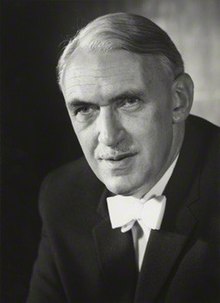Alan Bullock
|
The Right Honourable The Lord Bullock Kt FBA |
|
|---|---|

Bullock in 1969
|
|
| Vice-Chancellor of Oxford University | |
|
In office 1969–1973 |
|
| Preceded by | Kenneth Turpin |
| Succeeded by | Sir John Habakkuk |
| 1st Master of St Catherine's College, Oxford | |
|
In office 1962–1981 |
|
Alan Louis Charles Bullock, Baron Bullock, Kt, FBA (13 December 1914 – 2 February 2004) was a British historian. He is best known for his book Hitler: A Study in Tyranny (1952) which was the first comprehensive biography of Adolf Hitler and influenced many other major biographies of Hitler.
Bullock was born in Trowbridge in Wiltshire, England, where his father worked as a gardener and a Unitarian preacher. He was educated at Bradford Grammar School and Wadham College, Oxford, where he read classics and modern history. After graduating in 1938, he worked as a research assistant for Winston Churchill, who was writing his History of the English-Speaking Peoples. During World War II, Bullock worked for the European Service of the British Broadcasting Corporation (BBC). After the war he returned to Oxford as a history fellow at New College.
He was the founding master of St. Catherine's College, a college for undergraduates and graduates, divided between students of the sciences and the arts. He was credited with massive fundraising efforts to develop the college. Later he was the first full-time Vice-Chancellor of Oxford University.
In 1952, Bullock published Hitler: A Study in Tyranny, the first comprehensive biography of Adolf Hitler, which he based on the transcripts of the Nuremberg Trials. This book dominated Hitler scholarship for many years. The book characterised Hitler as an opportunistic Machtpolitiker ("power politician"). In Bullock's opinion, Hitler was a "mountebank", an opportunistic adventurer devoid of principles, beliefs or scruples whose actions throughout his career were motivated only by a lust for power. Bullock's views led in the 1950s to a debate with Hugh Trevor-Roper who argued that Hitler did possess beliefs, albeit repulsive ones, and that his actions were motivated by them. Bullock's Guardian obituary commented that "Bullock's famous maxim 'Hitler was jobbed into power by backstairs intrigue' has stood the test of time."
...
Wikipedia
